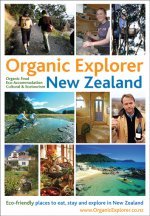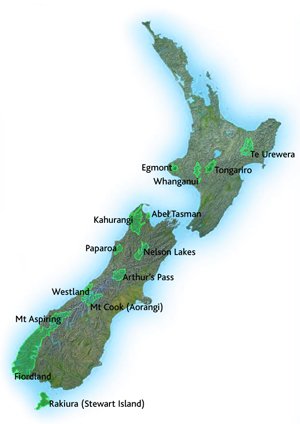|
|
NEW ZEALAND’S FIRST ECO-TRAVEL GUIDE
BUY NOW

Looking for the perfect holiday present that:
- Supports local economies
- Nurtures healthy living
- Supports New Zealand’s clean, green image
- Promotes sustainability
- Offers an unparalleled guide to organic food, sustainable accommodation and eco-travel?
Buy now for $27.75 including postage and packaging.
Or Buy the E-Book for $14.75 and download the PDF.
National Parks
 Approximately 30 percent of the country – more than five million hectares – is protected in environmentally important parks and reserves which embrace almost every conceivable landscape: from the golden beaches of Abel Tasman to the alpine environment of Arthur's Pass to the immense Whanganui River in the central North Island.
Approximately 30 percent of the country – more than five million hectares – is protected in environmentally important parks and reserves which embrace almost every conceivable landscape: from the golden beaches of Abel Tasman to the alpine environment of Arthur's Pass to the immense Whanganui River in the central North Island.There are 14 national parks, (those shown on the map adjacent), three maritime parks and 2 marine reserves along with numerous forest parks, offering huge scope for wilderness experiences, ranging from climbing, snow skiing and mountain biking to tramping, kayaking and trout fishing.
New Zealand also has two World Heritage sites. One is Tongariro National Park, the other comprises parts of Westland, Fiordland, Mount Cook and Mount Aspiring National Parks. This region covers 2.6 million hectares and is recognised internationally for it’s cultural significance as well as the unique vegetation and wildlife of the area.
Details
The Department of Conservation, which administers these areas, provides and maintains facilities, such as huts, tracks, camping grounds and picnic spots, and offers assistance and advice on how best to enjoy them. Some parks also have special facilities for the disabled.
see www.doc.govt.nz for a wealth of outdoor parks and recreation information
Parks are open all year round and no permits are required to visit. Most parks have a visitor center, with displays, maps and guide books. During the summer, many parks run programs for visitors, including guided walks.
There are no entry charges for the parks. A fee is charged for overnight stays in campsites and back-country huts. Contact any Department of Conservation office for details.
see www.doc.govt.nz for a wealth of outdoor parks and recreation information
Parks are open all year round and no permits are required to visit. Most parks have a visitor center, with displays, maps and guide books. During the summer, many parks run programs for visitors, including guided walks.
There are no entry charges for the parks. A fee is charged for overnight stays in campsites and back-country huts. Contact any Department of Conservation office for details.
For further information write to:
Department of Conservation
P.O. Box 10420,
Wellington, New Zealand.
Phone: (011644) 471 - 0726
Fax: (011644) 471 - 1082.



